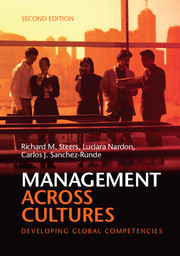Book contents
- Frontmatter
- Contents
- List of exhibits
- Guided Tour
- Introduction
- Part I Challenges for Global Managers
- 1 The new global realities
- 2 The new global managers
- Part II Developing Global Understanding
- Part III Developing Global Management Skills
- Appendix Models of national cultures
- Name and company index
- Subject index
- References
1 - The new global realities
from Part I - Challenges for Global Managers
- Frontmatter
- Contents
- List of exhibits
- Guided Tour
- Introduction
- Part I Challenges for Global Managers
- 1 The new global realities
- 2 The new global managers
- Part II Developing Global Understanding
- Part III Developing Global Management Skills
- Appendix Models of national cultures
- Name and company index
- Subject index
- References
Summary
Management challenge
No one said being a manager is easy, and this opening chapter illustrates why. With increasing globalization comes increased pressure for both change and competitiveness. Understanding this changing environment is our first challenge. The second is building mutually beneficial interpersonal and multicultural relationships with people in different parts of the globe in order to overcome these challenges and take advantage of the opportunities presented by the turbulent global environment. We argue here that an important key to succeeding in the global business environment is developing sufficient multicultural competence to work and manage successfully across cultures.
Chapter outline
▪ Globalization, change, and competitiveness page 13
▪ The emerging global landscape 19
▪ Management and multicultural competence 25
▪ Summary points 28
Applications
1.1 Canada Post 15
1.2 Hamburgers and A380s 18
1.3 Apple iPhone 19
1.4 Ethanol and the price of tortillas in Mexico 23
1.5 Launching a new venture in India 25
A competitive world offers two possibilities. You can lose. Or, if you want to win, you can change.
Lester Thurow Sloan School of Management, Massachusetts Institute of Technology, United StatesIn the future, the ability to learn faster than your competitors may be the only sustainable competitive advantage.
Arie de Geus Corporate planning director, Royal Dutch Shell, the NetherlandsWe live in a turbulent and contradictory world, in which there are few certainties and change is constant. Over time, we increasingly come to realize that much of what we think we see around us can, in reality, be something entirely different. We require greater perceptual accuracy just as the horizons become more and more cloudy. Business cycles are becoming more dynamic and unpredictable, and companies, institutions, and employees come and go with increasing regularity. Much of this uncertainty is the result of economic forces that are beyond the control of individuals and major corporations. Much results from recent waves of technological change that resist pressures for stability or predictability. Much also results from the failures of individuals and corporates to understand the realities on the ground when they pit themselves against local institutions, competitors, and cultures. Knowledge is definitely power when it comes to global business, and, as our knowledge base becomes more uncertain, companies and their managers seek help wherever they can find it.
- Type
- Chapter
- Information
- Management across CulturesDeveloping Global Competencies, pp. 11 - 29Publisher: Cambridge University PressPrint publication year: 2013



